
The Role of Peace Journalism
Izzadeen Ameen
If post-war peace is the end goal, reconciliation is the means to that end. Peace is not the absence of war; it is a process that needs to be nourished, sustained and cared for, just as farmers look after their crops, to avert the recurrence of war.
In a war, the enemy can be subdued, but the ideology that drove them to take up arms still survives. In the post-war situation, assimilation of different communities as well as achieving unity in diversity will be possible through a meticulously worked out reconciliation process. To ensure that the reconciliation process achieves its objectives, the responsibility is not only on the political leadership but also on civil society and journalists.
In Sri Lanka’s context, unfortunately, due to the 30-year ethnic conflict, the media remain divided along ethnic lines, promoting each ethnic group’s interests through journalism. The division was well highlighted in the manner in which the Sinhala and Tamil media reported the war. As a recent example, we can cite the different approaches the Sinhala and Tamil media adopted in reporting the protest march in Pottuvil. While the Tamil media gave ball-by-ball commentary and front-page importance to the march, rarely did the story get a prominent place in the Sinhala media or in the so-called national media, unless for reasons of criticism. Another example that highlights the media divide along ethnic lines is the reportage of Sri Lanka’s case before the United Nations Human Rights Council.
With Sri Lankan journalism being divided, promoting reconciliation through the media is not an easy task. In the early days after the end of the civil war, there was some movement in the direction of responsible post-conflict reporting. But there is very little talk about such reporting in the present Sri Lanka media scene. This lacuna, along with the practice of communal journalism, is all the more reason for a loud call for peace journalism as propounded by Prof. Johan Galtung. The learned professor calls on peace journalists to highlight backgrounds and contexts of conflicts; hear from all sides; explore hidden agendas and report peace ideas and initiatives.
To encourage peace journalism, media organizations such as the Sri Lanka Press Institute, the Editors’ Guild and the Publishers’ Society could initiate an annual peace journalism award based on journalists’ contributions towards peace-building among different communities. The private sector also could be roped in to support such an initiative because peace among different communities within the nation is an essential condition for economic growth.







